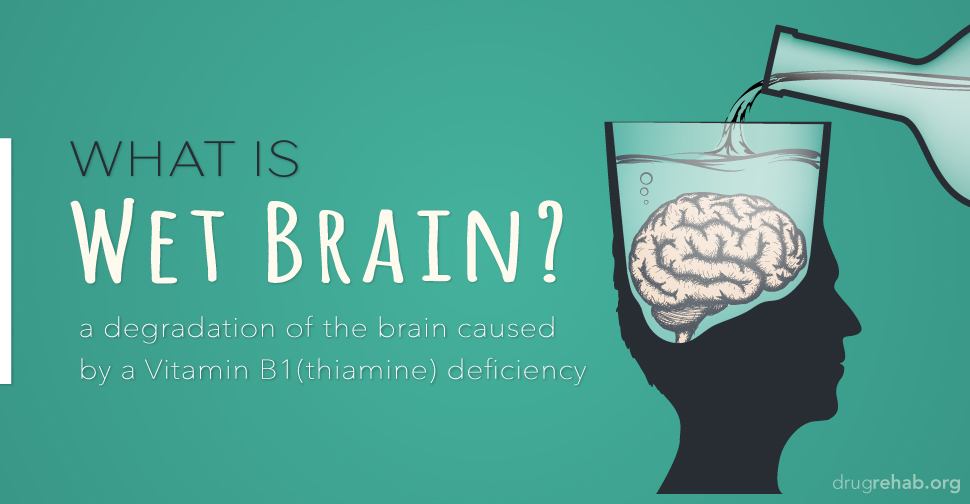
Characterized by hallucinations, unsteady gait, confusion, and amnesia, ‘wet brain’ is a degradation of the brain caused by a Vitamin B1 (thiamine) deficiency. Wet brain is also referred to as Wernicke-Korsakoff Syndrome by the medical community. While a variety of factors can come into play when a patient develops wet brain, alcoholism is a common cause of the Vitamin B1 deficiency that can lead to the disorder.
What Is Wet Brain?
Wet brain is actually a manifestation of two conditions; Wernicke’s encephalopathy and Korsakoff’s psychosis. Both Wernicke’s encephalopathy and Korsakoff’s psychosis present symptoms of degradation of the brain, however Korsakoff’s psychosis affects memory impairment while Wernicke’s encephalopathy is characterized by visual and gait impairments. While these conditions can occur separately, they are commonly diagnosed together.

The first phase of wet brain is Wernicke’s encephalopathy. This phase is usually brief, however, the onset of its symptoms can happen quickly. Classic symptoms of Wernicke’s encephalopathy can include:
- Loss of muscle coordination leading to unsteady gait and leg tremors
- Vision changes
- Eyelid drooping
- Confusion
- Double vision
- Loss of mental activity
Patients do not need to present all symptoms of Wernicke’s encephalopathy to be diagnosed with the disorder. In some patients, the symptoms of Wernicke’s encephalopathy may be mild and unnoticeable for the most part. If left untreated, it can cause coma or even death in many patients.

The second phase of wet brain is Korsakoff’s psychosis. Characterized by fast onset of memory impairment without any other decline in intellectual functions, Korsakoff’s psychosis develops as a result of the brain damage caused by Wernicke’s encephalopathy. The part of the brain that is damaged by Wernicke’s encephalopathy directly relates to memory creation and retention.
The symptoms of Korsakoff’s psychosis will generally develop once the symptoms of Wernicke’s encephalopathy go away. These symptoms can include:
- Amnesia
- Loss of memory – from mild to severe
- Making up memories or stories that never happened
- Hallucinations
- Inability to form new memories
How Does Alcohol Cause Wet Brain?
Alcoholism and chronic alcohol abuse do not directly cause wet brain, however they are the most common cause of wet brain. The brain damage associated with Wernicke-Korsakoff Syndrome is actually caused by a Vitamin B1, or thiamine, deficiency. Thiamine is required for the presence of several enzymes that assist in breaking down sugar and carbs into other energy molecules. The absence of this results in brain damage.
Because high levels of thiamine are stored in your heart, kidney, brain, and liver, prolonged or excessive amounts of alcohol consumption can prevent the absorption of thiamine into your liver or gastrointestinal tract. Excessive alcohol consumption can also have a negative effect on the thiamine currently stored in your system.

Alcoholism and alcohol abuse, however, are not the only causes of Wernicke-Korsakoff Syndrome. Because the syndrome is actually caused by a thiamine deficiency, other sources of malnutrition can also be a cause of the symptoms. Eating disorders, starvation, AIDs, and cancer can also cause malnutrition and thiamine deficiency severe enough to cause Wernicke-Korsakoff Syndrome.
Treatment For Wet Brain
Wet brain diagnosis will usually involve a series of tests including thiamine and other vitamin levels in the blood, CT or brain scans, liver function, and MRIs to measure for bleeding or tumors in the brain. Along with the results of these tests, cognitive and memory performance will also be measured to compare with the symptoms of Wernicke’s encephalopathy and Korsakoff’s psychosis individually.
Once wet brain is diagnosed in an alcoholic patient, a thiamine injection will be promptly administered in an attempt to get thiamine levels back up. While the thiamine injection can improve confusion and unsteady gait in a patient, any memory loss the patient currently suffers from will likely remain the same.
Immediate abstinence from alcohol is also recommended, along with a well balanced diet. Inpatient rehab along with other drug rehabilitation programs are highly recommended to ensure the proper detox of a patient suffering from alcoholism as well as to reduce the likelihood of a relapse down the road.
Without treatment, Wernicke-Korsakoff Syndrome will likely result in death. With treatment, it is possible to control and improve some of the symptoms associated with the syndrome such as confusion and unsteady gait. If the syndrome is caught early enough, it is possible to administer treatment in time to help reverse some of the effects that have already started taking place.
Get Help
If you or a loved one suffers from alcoholism or the symptoms of wet brain, it is essential you seek out professional help. Wet brain does not always present itself in obvious ways, but it is very life-threatening. In certain cases, by the time it is diagnosed there is already permanent brain damage for the patient.
Our addiction specialists are standing by to take your call and offer more insight to the rehab programs available for alcoholism and alcohol abuse. Your call is always confidential, and we can get you started on the road to recovery. Call us today.
For More Information Related to “What is “Wet Brain”?” Be Sure To Check Out These Additional Resources From DrugRehab.org:
- How Long Does Alcohol Stay in Your System?
- What Helps With Alcohol Withdrawal?
- Alcohol Poisoning – Over 50,000 Cases Each Year
- Heroin and Alcohol: A Deadly Combination
- What is Alcoholic Hepatitis?
- How Drugs And Alcohol Affect Your Immune System
Sources
National Organization for Rare Disorders – Wernicke-Korsakoff Syndrome
The Scientific World Journal – Thiamine Deficiency Induced Neurochemical, Neuroanatomical, and Neuropsychological Alterations: A Reappraisal

